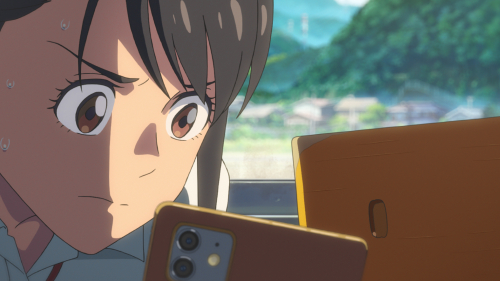
"Suzume" Film Partners/Crunchyroll
MOVIE REVIEW
Suzume (2023)
American cinema currently churns out an endless parade of superhero movies to counteract how powerless most Americans now feel, but Japanese art is the best in the world at metaphors for trauma. “Godzilla” and its uncontrollable rampages through Tokyo and other cities was an obvious stand-in for nuclear destruction, and its many imitators were able to exist because the need was still there. “Suzume” is more specifically about a more recent disaster, that of the Tōhoku earthquake and tsunami in 2011, but its combination of the supernatural and modern everyday life builds to create a tearjerker of surprising emotional power.
Suzume (voiced by Nanoka Hara) is a 17-year-old girl living with her aunt Tamaki (Eri Fukatsu) in the south of Japan. On her way to school one morning she encounters a handsome, slightly older stranger. She's so attracted to him she spontaneously cuts school and goes searching for him in the abandoned town he'd asked for directions to. Instead she finds a lone door in a ruined building, and when she opens it she sees into another world. In her panic Suzume also picks up a nearby stone, which shapeshifts into a cat and runs off. Understandably freaked out, she runs back to school. When everyone's phones explode with an earthquake alarm she looks out the window and sees a horrible giant red thing – Souta (Hokuto Matsumura) calls it a worm – climbing into the sky. The red thing is a supernatural force that causes Japan's natural disasters; and it was able to escape the underworld because of Suzume. She didn't close the door she found, which was a portal; and also the cat was the keystone locking it shut; and its absence means the entire nation is now at extra risk. But Suzume is a good kid, so rushes back to try to do the right thing. That decision changes her whole world.
Souta is a grad student, but also part of a secret society of closers, who travel the abandoned and derelict places in Japan to ensure portals stay closed in order to minimize natural disasters. Suzume is horrified by the trouble she's causes and takes Souta home to dress his injuries. While there, the cat, who calls himself Daijin (Ann Yamane) shows up and jealously transmogrifies Souta's body into a child-sized chair Suzume’s late mother made for her, which has only three legs. The chase is therefore on; Suzume must help chair-Souta be restored to his human form, and shut down any worm breakouts they encounter on the way. When Suzume disappears, Tamaki is distraught and blows up her phone like you wouldn't believe, among other attempts at getting her home. But what’s one worried aunt against the imminent destruction of the nation, and a hot older boy you really like?
You’d think a romance between a human and an inanimate object couldn’t be done, but writer-director-editor Makoto Shinkai does the impossible here, which is why this was the first animated film to compete at the Berlinale since “Spirited Away.” The way the rapport between Suzume and chair-Souta develops is very tough to explain but utterly believable, though probably the normal suspension of disbelief to animated stories helps. The unusual characters and high concept are counterbalanced with the attention to detail we've come to expect from Japanese films – bloody socks, a convertible with a broken roof, concrete getting soaked with the first raindrops. Its ability to depict everyday life is excellent too; Tamaki is able to track Suzume's location through her banking app; and Suzume tracks Daijin's journey around Japan through Instagram (it really is that cute of a cat). At one point a bar mama named Rumi (Sairi Ito) gives Suzume a lift, with her exhausting toddler twins in the back; and they get McDonald’s, which they eat in the car. Chair-Souta prevents some spills, which the kids notice, and test, as Rumi and Suzume chat. Most of the people Suzume encounters on her journeys are women, who are kind and eager to help, which is an unusual gender split for a road movie, but it centers ordinary life in a pleasingly pointed fashion. Suzume might be on the run for her new boyfriend’s life, but she still has to keep her mobile phone charged.
As an exploration with how people cope with trauma and figure out how to maintain a normal life in the shadow of disaster, this is almost incomparable. It's always dreadfully nihilistic to hear a teenager saying they don't fear death because life is a matter of luck, but here it's of a piece with Suzume's adventures in Japan's abandoned places, such as a middle school abandoned after a landslip, and an amusement park the owners can't afford to tear down. As a reminder of how society permanently exists on the permanent brink of disaster, “Suzume” knows better than most what’s truly important. The tearjerker final act, which melds the importance of the chair, Souta’s life choices, Daijin's cuteness, Suzume's childhood losses and Tamaki's sacrifices into a literally otherworldly finale, manages both to account for the whole of human suffering but also provide hope for the future. What superhero movie has managed that?
Comments